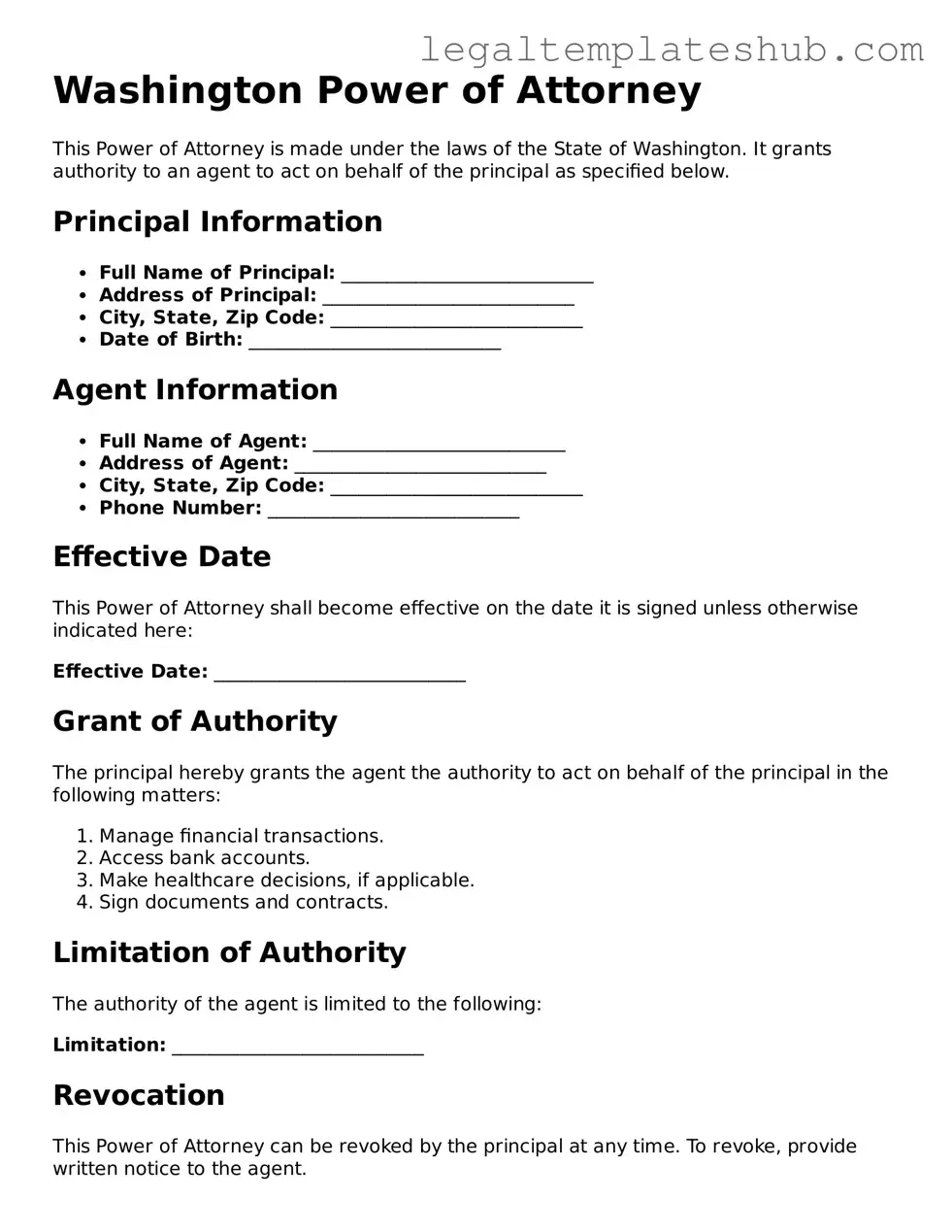Printable Power of Attorney Document for Washington
PDF Form Data
| Fact Name | Details |
|---|---|
| Definition | A Washington Power of Attorney form allows an individual to designate another person to make decisions on their behalf, particularly in financial or medical matters. |
| Governing Law | The Washington Power of Attorney is governed by the Revised Code of Washington (RCW) Chapter 11.125. |
| Types of Powers | The form can grant broad or limited powers, depending on the needs of the principal. This can include managing finances, real estate transactions, or healthcare decisions. |
| Durability | A Power of Attorney in Washington can be durable, meaning it remains effective even if the principal becomes incapacitated, unless specified otherwise. |
| Revocation | The principal can revoke the Power of Attorney at any time, provided they are mentally competent. This can be done through a written notice to the agent. |
Key takeaways
Filling out and using the Washington Power of Attorney form requires careful attention. Here are key takeaways to keep in mind:
- Understand the Types: There are different types of Power of Attorney, such as general and limited. Choose the one that fits your needs.
- Choose Your Agent Wisely: Your agent will act on your behalf. Select someone you trust to make decisions in your best interest.
- Be Specific: Clearly outline the powers you are granting to your agent. This helps avoid confusion and ensures your wishes are respected.
- Sign and Date: The form must be signed and dated by you in the presence of a notary public or two witnesses to be valid.
- Review Regularly: Life circumstances change. Regularly review your Power of Attorney to ensure it still meets your needs.
- Understand Revocation: You can revoke your Power of Attorney at any time. Make sure to notify your agent and any institutions involved.
Dos and Don'ts
When filling out the Washington Power of Attorney form, it's important to follow certain guidelines. Here are some things you should and shouldn't do:
- Do read the entire form carefully before starting.
- Do provide accurate information about yourself and the person you are appointing.
- Do sign the form in front of a notary public.
- Do keep a copy of the completed form for your records.
- Do discuss your decisions with the person you are appointing.
- Don't leave any sections of the form blank unless instructed.
- Don't use outdated forms; always use the latest version.
- Don't rush through the process; take your time to ensure accuracy.
- Don't forget to revoke any previous Power of Attorney if applicable.
Following these guidelines can help ensure that your Power of Attorney is valid and reflects your wishes. Take your time and be thorough.
More Power of Attorney State Templates
Power of Attorney Texas Pdf - Assistive legal guidance can enhance the effective use of Power of Attorney.
In addition to ensuring a smooth transfer of ownership, utilizing the Pennsylvania Bill of Sale form can enhance the security of your transaction, and for those looking for reliable templates, PDF Templates can be a valuable resource.
Printable Poa Forms - Gives peace of mind by defining clear lines of authority.
Instructions on Filling in Washington Power of Attorney
Filling out the Washington Power of Attorney form is a straightforward process. Once you have completed the form, it will allow you to designate someone to handle your financial or medical decisions if you are unable to do so. Follow these steps carefully to ensure everything is filled out correctly.
- Obtain the Washington Power of Attorney form. You can find it online or at a local legal office.
- Read through the form to understand the sections that need to be filled out.
- In the first section, provide your full name and address. This identifies you as the principal.
- Next, designate your agent by entering their full name and address. This person will act on your behalf.
- Specify the powers you want to grant your agent. Be clear about what decisions they can make.
- If applicable, add any limitations or specific instructions regarding your agent's authority.
- Sign and date the form at the designated area. Your signature must match your legal name.
- Have the form notarized. This step is essential for the document to be legally binding.
- Distribute copies of the signed and notarized form to your agent and any relevant institutions.
Misconceptions
When it comes to the Washington Power of Attorney form, several misconceptions often arise. Understanding the facts can help you make informed decisions. Here are four common misunderstandings:
-
Misconception 1: A Power of Attorney is only for financial matters.
This is not true. While many people use a Power of Attorney for financial decisions, it can also cover health care and other personal matters. You can specify what powers you want to grant.
-
Misconception 2: Once I sign a Power of Attorney, I lose control over my decisions.
Actually, you retain control. You can revoke or change your Power of Attorney at any time, as long as you are mentally competent. The document only takes effect under the conditions you set.
-
Misconception 3: A Power of Attorney is only necessary for older adults.
This is a common belief, but anyone can benefit from having a Power of Attorney. Unexpected situations can arise at any age, and having this document in place can ensure your wishes are followed.
-
Misconception 4: I can create a Power of Attorney without any legal help.
While it is possible to create one on your own, it's wise to seek assistance. Legal professionals can help ensure that your document meets all requirements and accurately reflects your wishes.
